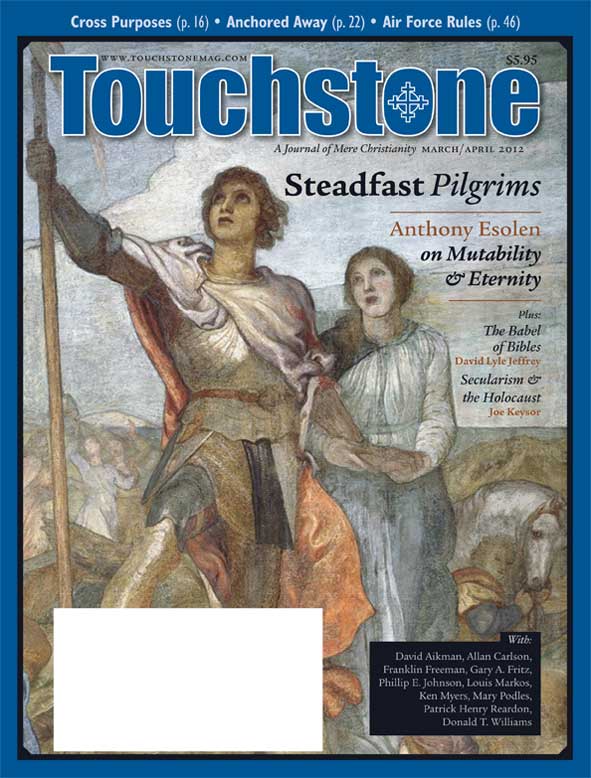Saints by Numbers
Will the Religious Inherit the Earth?
"Christianity is not a fertility cult!” This was the message heard from numerous Protestant and Catholic pulpits in the early 1960s, as a broad revulsion toward the American baby boom of the prior decade set in among progressive theologians and preachers. Spurred on by fear of a global “population explosion,” the worries of these Christian innovators actually rested on real developments among mere Christians. While the mainline Protestant churches of the 1930s and 1940s had warmed up to the practice of birth control, Evangelical Protestants had held back, still faithful to the old Christian consensus regarding the sinfulness of contraception. As a result, they had shown fertility rates significantly higher than those found among the contracepting liberals.
American Roman Catholics had also exhibited unusual behavior. During the 1920s and 1930s, overall Protestant and Catholic fertility rates had significantly converged, while both headed downwards. During the baby boom, though, they diverged again. While the total fertility rate of non-Catholic Americans was an average of 3.15 children born per woman in 1951 and 3.14 in 1961, the comparative figures for Catholics were 3.54 and 4.25. More dramatic was the return of the large Catholic family. In 1952, only 10 percent of Catholics under age 40 reported having four or more children, a number close to the Protestant figure of 9 percent. By 1959, the Protestant figure was unchanged, but the Catholic figure had soared to 22 percent.
Christian Reproductive Consensus
Now, it is correct to say that Christianity is in no way a “fertility cult,” least of all in the usual pagan expressions of that phrase. All the same, Christianity is unique among the world’s religions in the great attention it gives to the birth of a baby and the consequent maternal-infant bond.
Moreover, the early Christians proved to be remarkably fruitful. While their pagan Roman neighbors practiced contraception, abortion, and infanticide, allowed for easy divorce, and had a preponderance of males (due to female infanticide), the new Christian movement strongly opposed abortion and infanticide, discouraged birth control and divorce, and had a high proportion of members who were women in their fertile years. Religious sociologist Rodney Stark concludes that “a nontrivial portion of Christian growth was due to superior fertility.” Christian numbers rose from a mere handful of followers in a.d. 40 to six million by the early fourth century, when the Mediterranean world effectively became theirs. And there is that peculiar passage in First Timothy (2:15), much reviled by the feminists, in which Paul teaches that “women will be saved through bearing children.”
Also pronounced was the reproductive consensus that had been a constant feature of Christianity—until the mid-twentieth century. The welcome of children in abundance and the opposition to contraception, abortion, and infanticide survived Christian divisions on other matters in the eleventh and sixteenth centuries. As the Anglican author Richard Fagley wrote in 1960: “For all practical purposes, the ethos of Wittenberg and Geneva and Canterbury was as strongly pro-fertility as that of Rome.” That same year, an Orthodox representative to the World Council of Churches emphasized that his church still held “that parents have not the right to prevent the creative process of matrimonial intercourse; also, that God entrusted to them this responsibility for childbearing, with full confidence that his Providence would take care of material and other needs.”
Demographic Transformation
Attention to the fertility effects of religious faith has been revived in recent months by Eric Kaufmann’s book, Shall the Religious Inherit the Earth? Demography and Politics in the Twenty-First Century. A Reader in Politics at Birkbeck College, the University of London, Kaufmann describes himself as a secular liberal. All the same, he argues that “religious fundamentalists are on the course to take over the world through demography.” He defines “fundamentalist” broadly to include Jews, Christians, and Muslims around the globe who take their beliefs seriously enough to allow scriptural teachings on marriage and procreation to influence their behavior.
Examining current population trends, Kaufmann concludes that the future of the human race most probably lies with groups, now on the cultural margins, that are still faithful to God’s command, “Be fruitful and multiply.” He points to the Old Order Anabaptists (e.g., the Amish and the Hutterites), American Mormons, Ultra-Orthodox or Haredi Jews, Salafi Islamists, Laestadian Lutherans (found in the Finnish, Swedish, and Canadian northwoods), and “Quiverfull” Protestants as the future of the human race. (Some anecdotal evidence suggests that he could have added in “Latin Mass” Catholics as well.) With fertility rates of between four and nine children born per woman, and in the general context of tumbling global fertility, these groups are already expanding their size relative to the earth’s population. If compounded over another four generations, the transformation would be staggering.
Allan C. Carlson is the John Howard Distinguished Senior Fellow at the International Organization for the Family. His most recent book is Family Cycles: Strength, Decline & Renewal in American Domestic Life, 1630-2000 (Transaction, 2016). He and his wife have four grown children and nine grandchildren. A "cradle Lutheran," he worships in a congregation of the Lutheran Church-Missouri Synod. He is a senior editor for Touchstone.
subscription options
Order
Print/Online Subscription

Get six issues (one year) of Touchstone PLUS full online access including pdf downloads for only $39.95. That's only $3.34 per month!
Order
Online Only
Subscription

Get a one-year full-access subscription to the Touchstone online archives for only $19.95. That's only $1.66 per month!
bulk subscriptions
Order Touchstone subscriptions in bulk and save $10 per sub! Each subscription includes 6 issues of Touchstone plus full online access to touchstonemag.com—including archives, videos, and pdf downloads of recent issues for only $29.95 each! Great for churches or study groups.
Transactions will be processed on a secure server.
more from the online archives
calling all readers
Please Donate
"There are magazines worth reading but few worth saving . . . Touchstone is just such a magazine."
—Alice von Hildebrand
"Here we do not concede one square millimeter of territory to falsehood, folly, contemporary sentimentality, or fashion. We speak the truth, and let God be our judge. . . . Touchstone is the one committedly Christian conservative journal."
—Anthony Esolen, Touchstone senior editor










